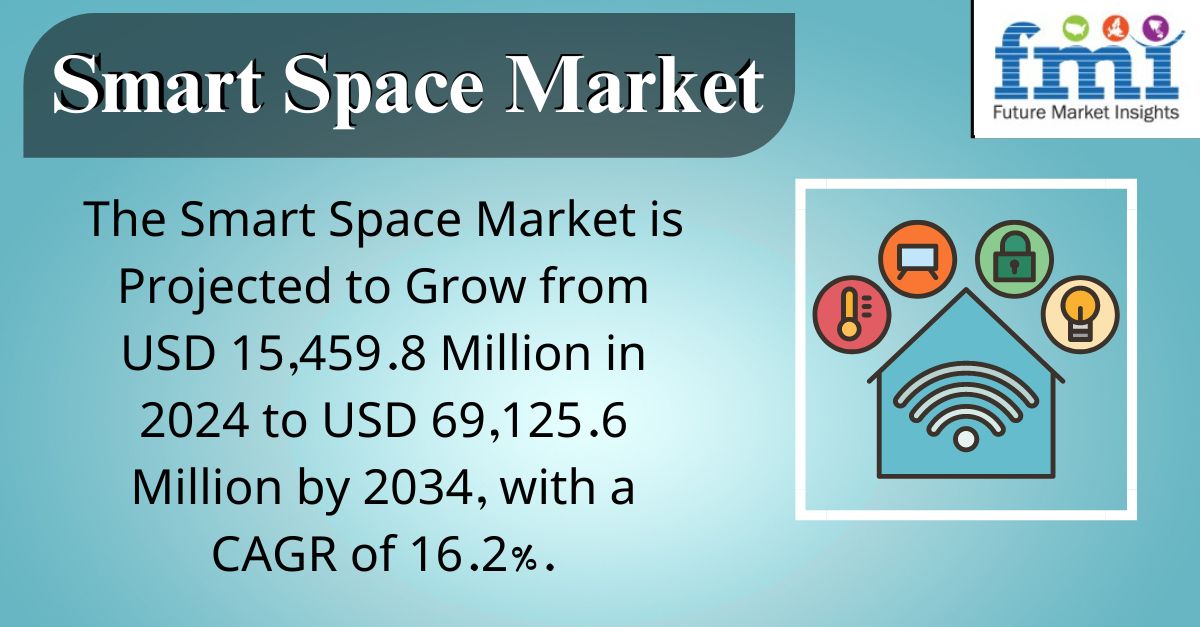Global Smart Space Market to Reach USD 69,125.6 Million by 2034, Growing at a 16.2% CAGR | Future Market Insights, Inc.

The smart space industry is predicted to grow at a CAGR of 17.4% in Japan. The market is anticipated to register a CAGR of 19.7% in Australia during the forecast period.
NEWARK, Del, Aug. 06, 2024 (GLOBE NEWSWIRE) —
The smart space market is expected to be valued at USD 15,459.8 million in 2024. The market is expected to progress at an astonishing rate over the forecast period, with a CAGR of 16.2%. By 2034, the value of the market is forecast to reach USD 69,125.6 Million.
Both office and residential spaces are transforming into smart spaces at a positive rate. With technology infiltrating an increase in daily aspects for people, smart spaces are becoming a more common phenomenon, both for working and for living. While smart spaces are typically associated with economically well-off nations, developing countries are also making efforts to transform their cities into smart spaces.
The government’s drive to build smart cities is helping the market. Local authorities of urban areas are concentrating on developing smart spaces as a way of dealing with the ever-increasing settling of people into cities. The desire of people to live in smart buildings and homes is also driving the adoption of smart spaces.
Request for a Sample of this Research Report: https://www.futuremarketinsights.com/reports/sample/rep-gb-11860
Smart spaces are helping businesses to track compliances as well as maximize profit. For example, energy management and optimization assist organizations in complying with mandated rules while also cutting down on costs. For public bodies, security, and infrastructure development are primary concerns that smart spaces help with.
Key Takeaways from the Smart Space Market Report:
- The smart space market is anticipated to be valued at USD 15,459.8 million in 2024.
- Hardware is a popular component of smart spaces. For 2024, hardware is expected to contribute to 45.3% of the market share.
- Energy management and optimization is the leader in the application segment. For 2024, energy management and optimization is expected to contribute to 23.9% of the share.
- Australia is one of the promising countries in the market. The CAGR for Australia over the forecast period is anticipated to be 19.7%.
- Japan is poised to be one of the most lucrative Asian countries in the market. For the 2024 to 2034 period, the CAGR for Japan is pegged at 17.4%.
What Factors are Primarily Influencing the Smart Space Market Share?
The growing momentum of the adoption rate of sustainable green building initiatives can be witnessed due to environmental concerns and the penetration of technology in our daily lives. These buildings rely on smart technologies integrated with the overall system to improve the building’s performance and functions, thereby spiking the overall demand for smart space technology.
The smart space market trends are also greatly fostered by these technologies as they store valuable data and analyze it and provide it to the appropriate person. When increasingly sophisticated communications and control systems are built into a building from the start, the door to endless innovations is opened, creating numerous smart space market opportunities.
When integrated into construction procedures and used throughout the product’s life, energy consumption is reduced, and the environment is better protected, encouraging people from around the globe to opt for the same.
The smart space market outlook is positively impacted as smart construction can create a more comfortable built environment while also lowering a site’s carbon footprint. Self-sustaining buildings are considered the best solution for meeting the ever-increasing technological and energy demand, as well as many countries’ stated goals of becoming independent of carbon-based energy sources.
Smart space solutions and services are relatively new to the market, and many companies are entering them with novel products and services. As a result, demand for smart space solutions goes down as early adopters are paying exorbitant fees to have this technology installed.
Governments are making greater efforts to make public spaces smarter with emerging technologies. Even when governments have the need, vision, and clarity for such transformations, a lack of budgetary allocations for large-scale implementations directly or indirectly slows the pace of the transformation process.
Such large investments may also increase the economic burden of debt-ridden governments or local municipal authorities, affecting future general budgets, in turn, negatively impacting the smart space market trends and forecasts.
Get A Full Report Analysis: https://www.futuremarketinsights.com/checkout/11860
Competition Analysis of the Smart Space Market
Market companies are collaborating with governments and local authorities since smart spaces are frequently integrated into smart cities. Industry specialists are also participating in smart city programs by making their technologies available to local authorities. Collaborations with interior design firms are prevalent when developing smart spaces for homes and offices.
The market is fiercely competitive, with large corporations battling smaller businesses for a piece of the pie. Startup culture is also prevalent, with technological innovation serving as a key component in helping new entrants stand out.
Key Companies in the Smart Space Market
- Cisco
- Siemens
- Huawei Technologies
- IBM
- Schneider Electric
Recent Developments in the Smart Space Market
- In January 2024, the King Abdullah Financial District Development and Management Co. and the Saudi Co. for Artificial Intelligence formed a partnership to develop smart traffic solutions in Riyadh.
- In November 2023, Thales Alenia Space announced plans to open a smart factory in Rome.
Smart Space Market Segmentation:
By Component:
- Hardware
- Software
- Solutions
By Application:
- Energy Management and Optimization
- Emergency Management
- Security Management
- Others
By Premises Type:
- Commercial
- Residential
- Others
By Region:
- North America
- Latin America
- Europe
- South Asia
- East Asia
- Oceania
- The Middle East and Africa (MEA)
Author By:
Sudip Saha is the managing director and co-founder at Future Market Insights, an award-winning market research and consulting firm. Sudip is committed to shaping the market research industry with credible solutions and constantly makes a buzz in the media with his thought leadership. His vast experience in market research and project management a consumer electronics will likely remain the leading end-use sector cross verticals in APAC, EMEA, and the Americas reflects his growth-oriented approach to clients.
He is a strong believer and proponent of innovation-based solutions, emphasizing customized solutions to meet one client’s requirements at a time. His foresightedness and visionary approach recently got him recognized as the ‘Global Icon in Business Consulting’ at the ET Inspiring Leaders Awards 2022.
Have a Look at the Related Reports of the Technology Domain:
The increasing demand for space DC-DC converters is driven by the growing need for efficient power management in compact, high-performance electronic systems and aerospace applications.
The aerospace head-up display market is being driven by an increasing demand for the elimination of distractions during aircraft operational operations to provide safe flying conditions.
The global smart hospitality and coworking spaces market is set to record a market value of USD 7.92 million in 2023, pushing the market size to USD 77.38 million in 2033. A CAGR of 25.6% indicates positive market growth over the forecast period.
The rapid implementation of TV white space spectrum technology to improve internet access in rural regions, combined with high demand for cost-effective broadband connectivity, is driving market expansion.
The growth of smart camera is revolutionizing security and automation, integrating advanced AI capabilities to enhance real-time surveillance, data analysis, and user convenience in various industries.
The trends in smart elevator automation systems reveal a shift towards AI integration, predictive maintenance, energy efficiency, and enhanced user experience through advanced controls and data analytics.
The smart home platform collects data from users and returns results based on the user’s preferences. They analyze stored data to foresee and prepare for possible future events that may occur in the context of smart homes.
The global smart mining market revenue is set to reach USD 13,919.5 million in 2023 and it is expected to surpass USD 40,365.1 million by 2033.
The surge in demand for smart agriculture solutions reflects a growing need for advanced technologies that optimize crop management, enhance resource efficiency, and drive sustainable farming practices in modern agriculture.
The rapid growth of smart TV is revolutionizing home entertainment, integrating advanced features like AI-driven recommendations and streaming services, and transforming viewing experiences into highly personalized and interactive events.
About Future Market Insights (FMI)
Future Market Insights, Inc. (ESOMAR certified, recipient of the Stevie Award, and a member of the Greater New York Chamber of Commerce) offers profound insights into the driving factors that are boosting demand in the market. FMI stands as the leading global provider of market intelligence, advisory services, consulting, and events for the Packaging, Food and Beverage, Consumer Technology, Healthcare, Industrial, and Chemicals markets. With a vast team of over 400 analysts worldwide, FMI provides global, regional, and local expertise on diverse domains and industry trends across more than 110 countries.
Contact Us:
Future Market Insights Inc.
Christiana Corporate, 200 Continental Drive,
Suite 401, Newark, Delaware – 19713, USA
T: +1-845-579-5705
For Sales Enquiries: [email protected]
Website: https://www.futuremarketinsights.com
LinkedIn| Twitter| Blogs | YouTube



